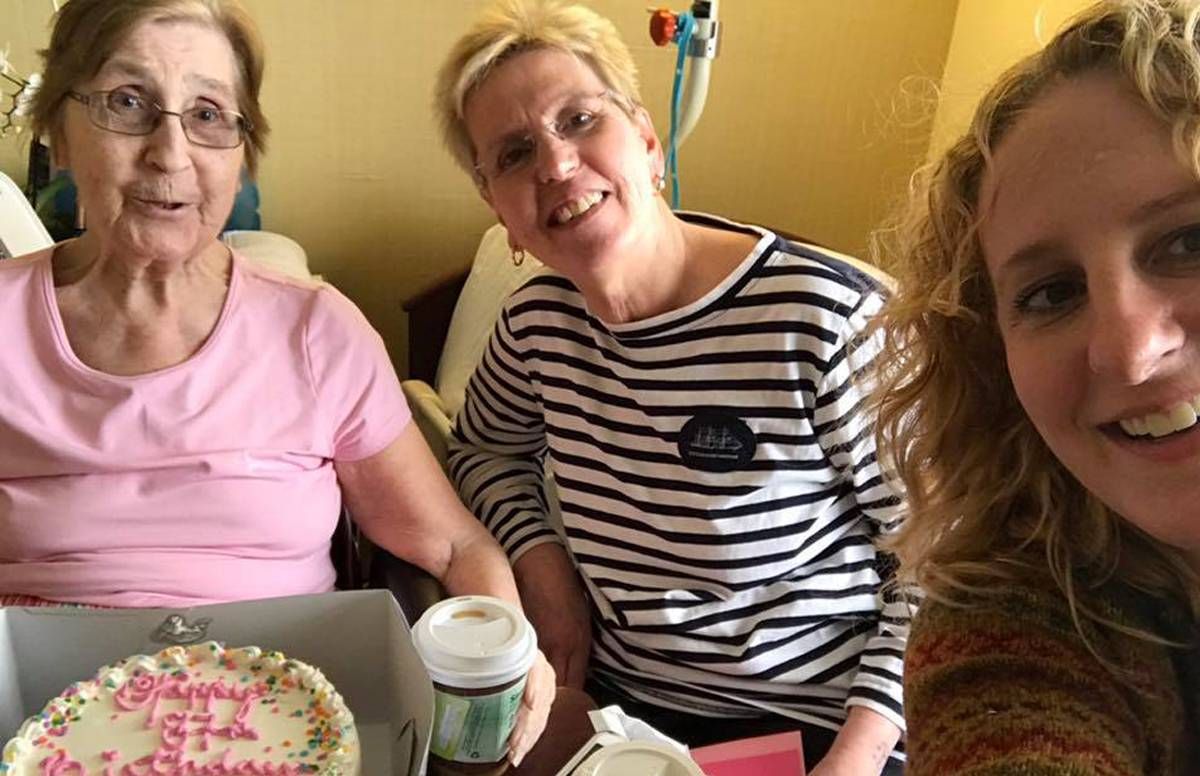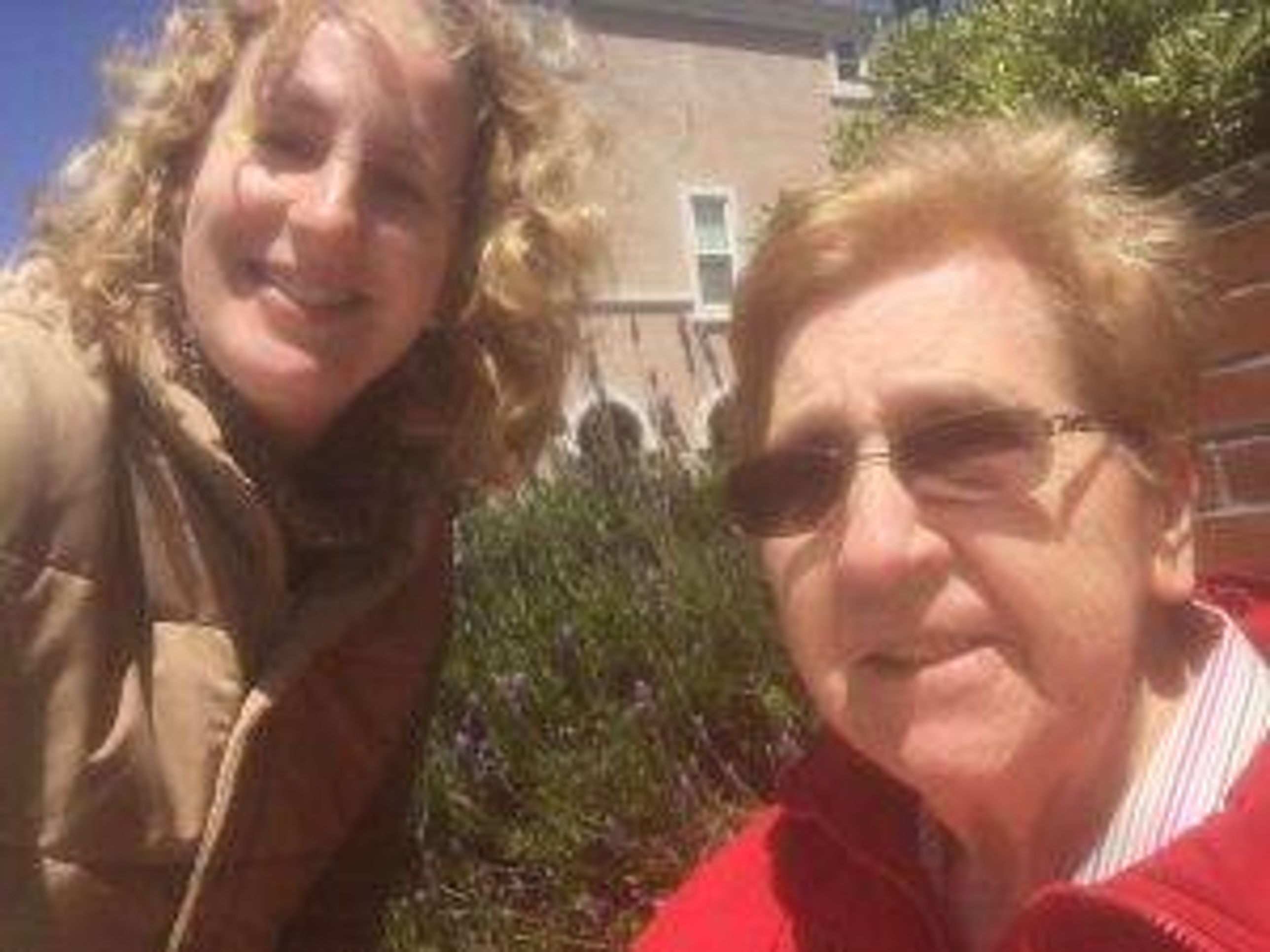Granting My Grandmother's Final Wish
Being unable to bury our dead makes it harder to resurrect our memories
Three years ago, I moved my grandmother — living in a senior community in a Detroit suburb, recently admitted to the hospital — to San Francisco via a medical Winnebago. I’d found her screaming with broken sacral bones nine hours after her last painkiller, a lone Tylenol.

“Grandma, would you like to come to California?” I asked, impulsively.
“Can we go there now?” she replied. A few days later, we covered 2,413 miles in 48 hours flat.
After three hard, painful years, my grandmother — who had dementia — died on February 11. By the time she was cremated, California, due to the pandemic, had a statewide shelter-in-place in effect. It would be irresponsible and reckless for my mother (a permanent resident of the UK), my brother in Chicago and me to travel and gather anytime soon, even to bury her.
In April, a San Francisco funeral home mailed my grandmother’s ashes to a cemetery in Michigan.
Burial, I’d hoped, was one thing I might do right, to do right by my grandmother. At long last, I could give her the one thing she’d wanted most, that for which she had prayed and begged these last six years: to be at rest beside my grandfather, who died in January 2014 a few days shy of their 63rd wedding anniversary.
Our Commitment to Covering the Coronavirus
We are committed to reliable reporting on the risks of the coronavirus and steps you can take to benefit you, your loved ones and others in your community. Read Next Avenue's Coronavirus Coverage.
The Suffering My Grandmother Endured
At the time, my grandmother knew she too would be gone in weeks, months at most. When she ordered his headstone, she also ordered hers, and had it engraved with her name, date of birth and a hyphen toward that unknown date. We know not the day or the hour and death comes like a thief in the night but, all that said, she knew it would come soon. That is what happened to couples like them; one followed the other. She’d been a more than devout Catholic. God would be good.
I have accompanied several people in their dying and scarcely could have imagined the suffering my grandmother endured.
He wasn’t. For three years, I tried mightily — in the broken, fraud-laden, expensive medical system Americans can no longer ignore, with its private-equity run emergency rooms and shortages of PPE (Personal Protective Equipment) and staff — to give and obtain the best possible care for my grandmother.
Despite this, she was usually treated in the way the pandemic has shown elderly people are: as expendable, as having taken enough time and resources already, as necessary sacrifices to corporate efficiency, as inevitable nursing home deaths that pose no reason not to reopen.
As badly as the system treated her, though, the last six weeks of her life were even worse. Like so many systems these days, hospice utterly failed at the one job it had: to provide a comfortable death. I have accompanied several people in their dying and scarcely could have imagined the suffering my grandmother endured.
Her body decomposed even as her heart and lungs pumped life into it. A wound at the base of her tailbone, so large I could have fit my fist inside with room to spare, tunneled until I saw her spine. Black Kennedy ulcers, risen blisters, bloomed every day across her back; a fingernail-sized one here, an orange-sized one there.
She could not stand to be awake. When I asked certain nurses for more pain medication, some implied I was too eager for her to die and would I like spiritual counseling?
Longing for the Good Memories

Besides carrying out my grandmother’s plans, burial might also remedy another sort of memory loss: mine. I hoped a memorial would provide a way to claw back more halcyon, rose-colored memories that family caregivers don’t get to keep.
Everyone else gets to remember a person who was, while caregivers get new memories of someone remade unrecognizable by disease, by a series of small strokes in my grandmother’s case.
As much as you might tell yourself, “This isn’t my grandmother, it’s a disease,” it is still her body scratching you, refusing to bathe, not wanting to change clothes and, stuck in an anxiety-induced dementia loop, calling you (or the bank) 71 times in a row, every two minutes, to ask the same question.
I know, of course, that my grandmother existed before and without dementia. I just can’t summon her, can’t remember how it felt to be in a room with her, what she said, what she sounded like when she said it, the affect in her voice and her gestures, how she looked walking down the long hallway in their mid-century ranch when she could still walk. How she turned her face toward the sun on her back porch.
I know, of course, that my grandmother existed before and without dementia. I just can't summon her, can't remember how it felt to be in a room with her,
At the memorial service before her burial, though, my grandmother’s friends would tell stories from different stages of her life, maybe one about the secret pen pal and gift group she started among workers at her community college. Or her time as union steward, "Norma Rae" in a Pendleton suit and pumps, later running a church phone tree to organize rosary nights for the families of people who died.
They would return my grandmother to me, tangibly, gradually wipe away the nightmares. I would replace my new memories with their old ones and, in so doing, recover. But, we weren't able to have the memorial I had hoped for.
Returning Her Home
On February 6, as my grandmother lay dying, a woman died of COVID-19 in Santa Clara County, just the other side of the eucalyptus-laden hills outside my grandmother’s front window. On February 11, in downtown San Francisco, the Grand Princess cruise ship departed the wharf for Mexico and my grandmother died.
The Grand Princess returned, and I visited a notary who could verify I was who I said I was, an executor, granddaughter and Power of Attorney who could legally obtain death certificates from the county and instruct the funeral home to cremate her.
I reminded myself that frugality was a higher-order value for my grandmother than any remaining religious faith. “Don’t you dare pay to ship to my whole body across the country,” she’d said more than once.
Now, we cannot bury our dead. After my grandmother is cremated, email messages confirm that her urn will be mailed to a cemetery in Michigan. My grandmother’s ashes will not pass through my hands: It is unwise to retrieve her urn myself due to exposure risk, what with funeral staff handling potential COVID-19 bodies and their family members.
The cemetery in Michigan calls to ask if they should hold her or open the grave site. My grandmother is my guide, so I give her the one thing she wanted: to be in the ground beside my grandfather, without delay. It has already taken too long for a woman who perennially said, “Home is wherever the two of us are, together.”
So that is where I send her, even though, this time, I cannot accompany her those 2,413 miles.

